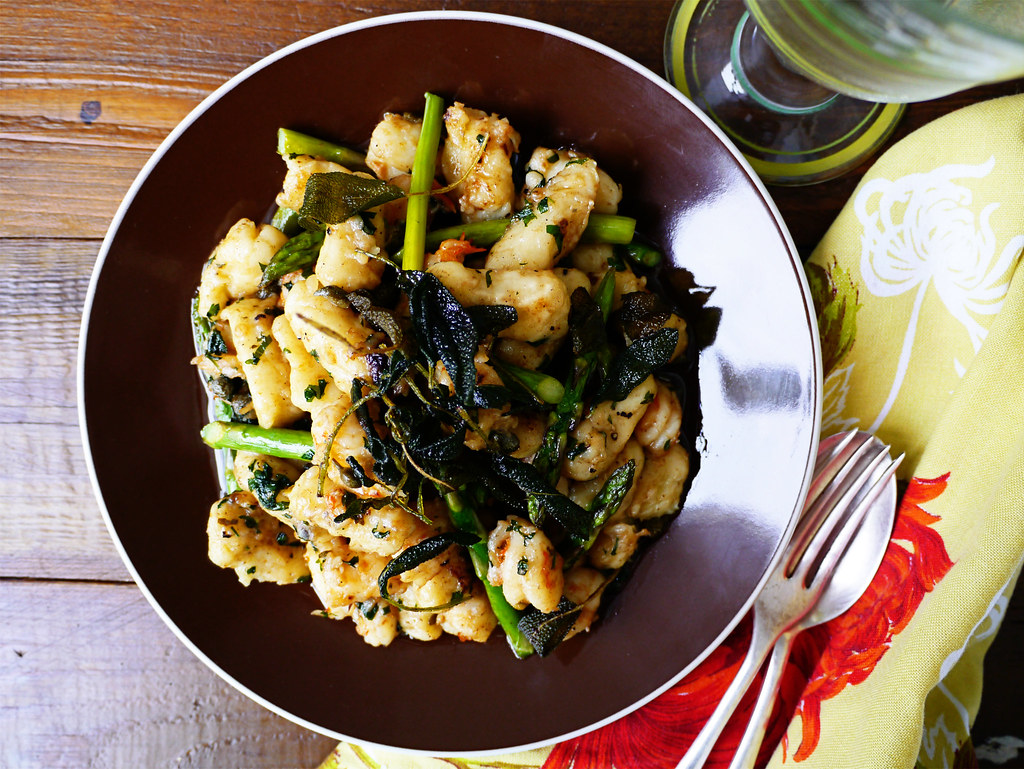
Note: This is an adaptation of Alex Herbert’s famous potato gnocchi recipe which I found here. Thanks Alex!
~
[dropcap]Gnocchi[/dropcap] (pronounced similar to “nyo-key”, or for an audio example and discussion, go here) are various thick, soft pastas. 1 They are basically small dumplings – cute, petite, plump, moreish ‘pillowy’ nubbles that are made from a variety of ingredients, including semolina, flour, egg, cheese, potato, breadcrumbs, etc. 2
Gnocchi were the perfect peasant food – filling and inexpensive, and for this reason, they’ve been made and appreciated in many parts of the the world for centuries. 3 Types of gnocchi include ‘malfatti’ (flour, ricotta, and spinach gnocchi), ‘cavatelli’ (flour-based), ‘gnocchi à la Parisienne’ (French dish made from cream puff dough), and potato gnocchi (you guessed it – made from starchy potatoes), etc. It is customarily eaten as a first course (primo piatto), as an alternative to soups (minestre) or pasta. 4
If my memory serves me correctly, I first made and tasted gnocchi with friends at uni many years ago, and the recipe back then was simple – potato, flour and egg – which we enjoyed making, and cooked with a store-bought tomato pasta sauce. We loved it, and not just because we were students.
I wanted to re-experience the joy of making and cooking gnocchi again and after scanning the web, I stumbled upon Alex’s ‘potato gnocchi with sauteed prawns in a burnt butter verjus sauce’ recipe, which is the inspiration for this post. Alex’s famous dish/recipe also appeared on Masterchef Celebrity Challenge a few years ago.
During my research, I also stumbled on a perfectly simple potato ngocchi recipe that does not use egg at Not Quite Nigella, and look forward to trying it another day. If you’re looking for a no-egg potato gnocchi alternative, be sure to check it out.
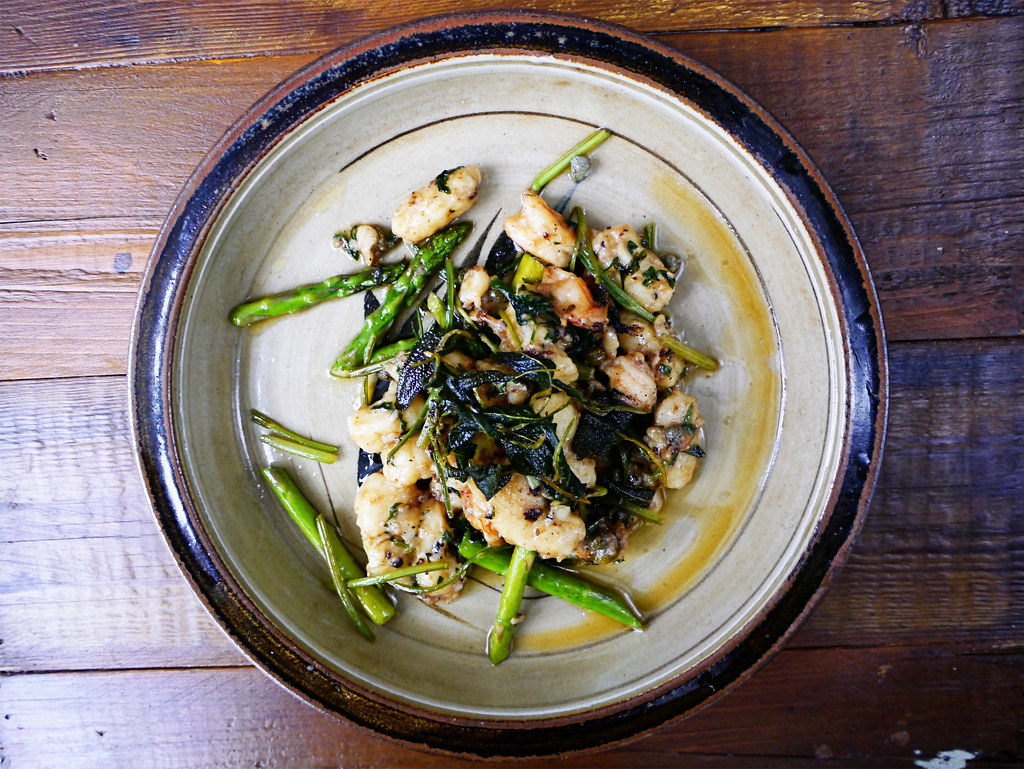
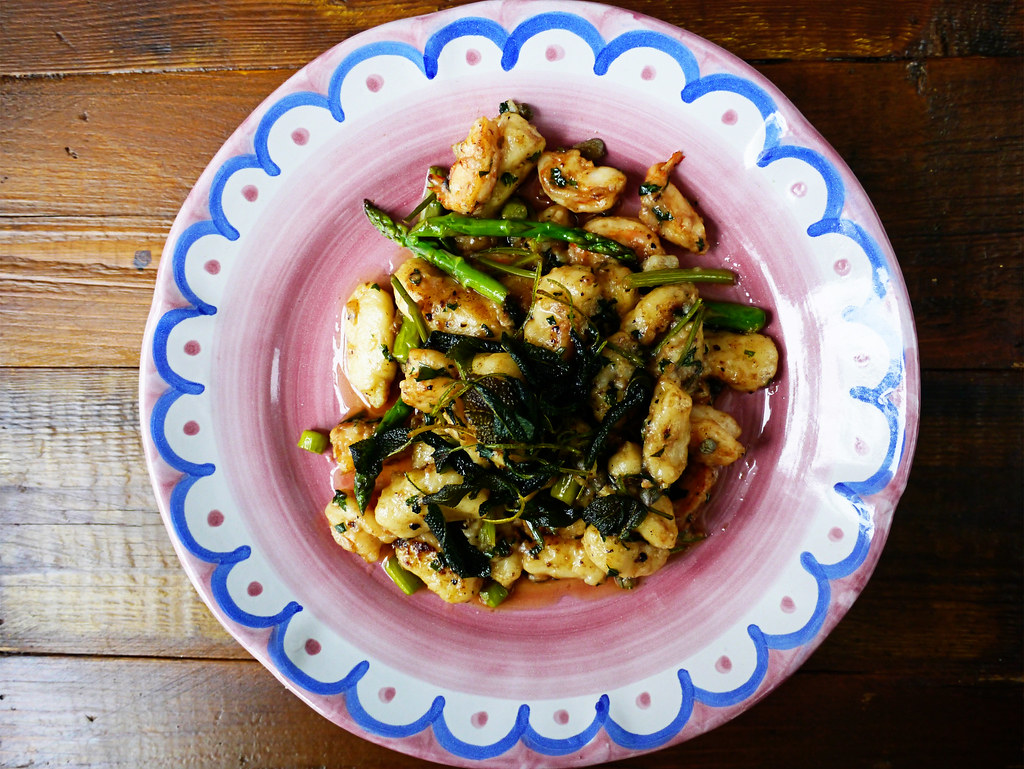
The following recipe is based on Alex’s recipe quite closely, although I made a few adjustments. I added asparagus to the mix because I adore asparagus and think they add a lovely natural sweet flavour, texture and colour to the dish. Of course, if you prefer, you can omit the asparagus or substitute it with other choice ingredients/vegetables/mushrooms, but remember to not overdo it by adding too many flavours/components to the recipe – best to keep it simple silly.
The secret to a great/light potato gnocchi is the choice/use of floury/starchy potatoes to keep a light texture. 5 Alex’s recipe called for 1.5 kg Desiree potatoes, which we could not find, but we did find and used ‘Golden Delight’ potatoes from Woolies instead which worked a treat – sort of. The potatoes came in a 4 kg bag and I had to guess how much 1.5 kg was. I think I used too many potatoes which affected the consistency of the gnocchi dough so I had to improvise/adjust the quantity of the flour to get it working properly. Furthermore, I used a potato masher instead of a mouli which I think changed the consistency of the dough as well. If you use exactly 1.5 kg of Desiree potatoes and a mouli for the recipe, it should work fine.
This style of gnocchi can also be made with other starchy vegetables, such as sweet potatoes or squash varieties. 6
I recently saw Jessica on My Kitchen Rules make cavatelli by rolling them on bamboo sushi mats to create the ridged pattern on the pasta which I thought was such a clever idea and wanted to use the same method to make the potato gnocchi. Unfortunately, the dough of my potato gnocchi was too soft for this method to work properly, so I just used the tines of a fork instead, which still created that lovely witchetty grub effect/look. Alternatively, you can use a gnocchi board instead, or not bother with creating the ridges/grooves, although it does help hold the sauce, and make them look totally gnocchi-licious.
Without further ado, here’s my pictorial adaptation of Alex Herbert’s potato gnocchi with sauteed prawns (and asparagus) in a burnt butter verjus sauce recipe. I must admit, it did take a bit of prep time but the final dish and flavours are extraordinary and well worth the effort. Please give this great recipe a try – you won’t regret it!
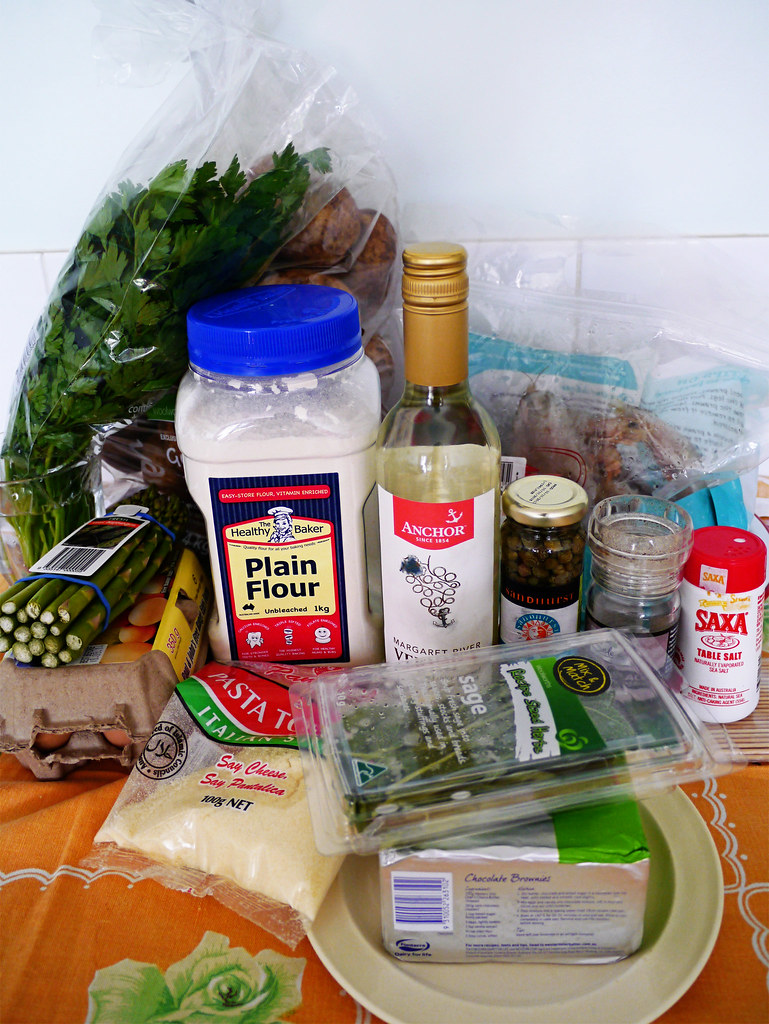
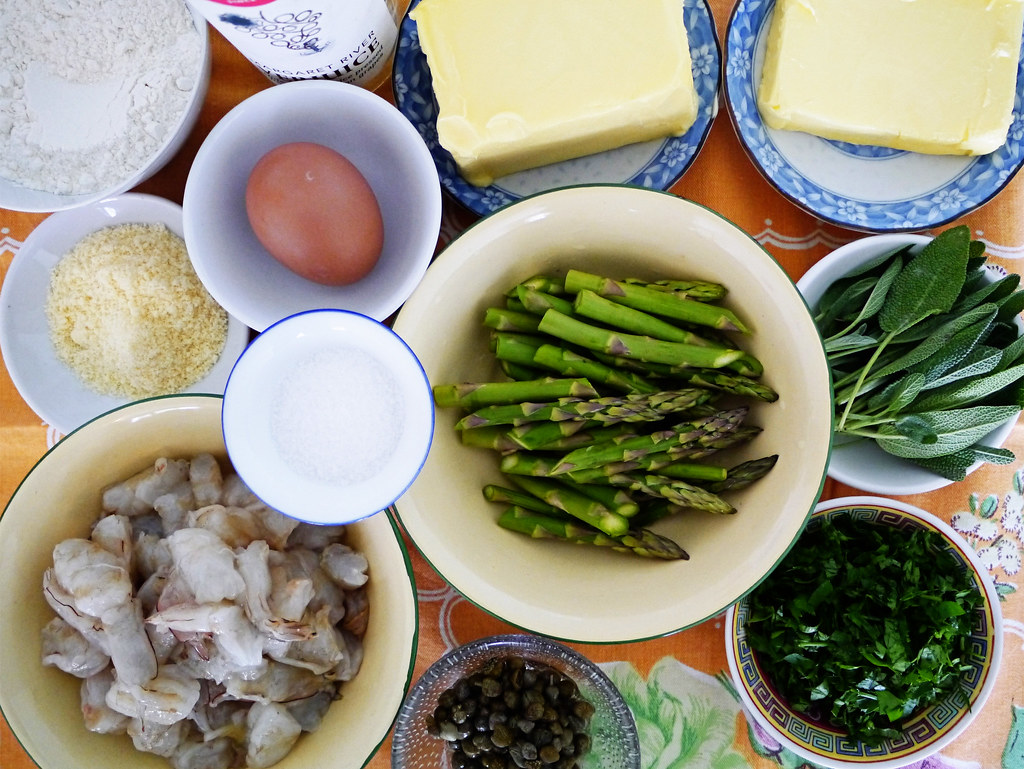
Mise en place – prep your ingredients first – makes cooking so much easier. Yes, there’s a lot of butter there – but the big block (200 grams) is used to crisp up the sage leaves and in turn make the sage butter, and only a fraction of the sage butter is used to deglase the pan to pour on the finished dish. Only 1/3 (20 grams) of the other block of butter is used to sauté the prawns each time the recipe is made for 2 servings.
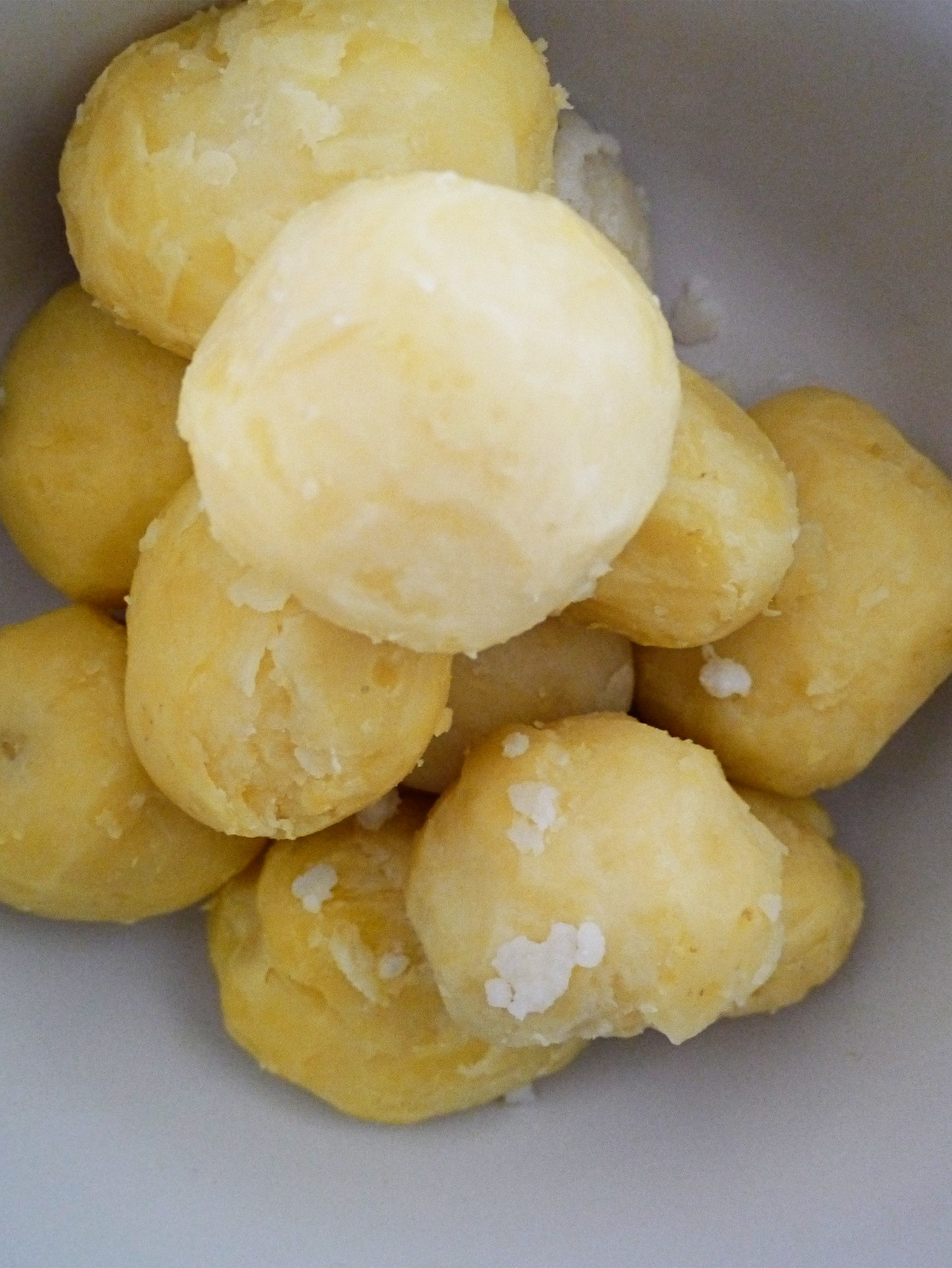
Place unpeeled potatoes in a large saucepan of cold water and bring to the boil. Reduce heat and simmer for 30 minutes or until tender. The potatoes must be neither under nor over cooked. Test with a skewer – when it is easily inserted, they are cooked (avoid testing too frequently otherwise they may become water logged). Drain potatoes into a colander, cover with a fresh tea towel and place colander over the original pot in a warm place for 10 minutes to drain completely. When potatoes are drained and cool enough to handle, peel them and pass through a mouli in batches, into the original dry saucepan. Optionally, you can use a potato masher or fork to mash the potatoes.
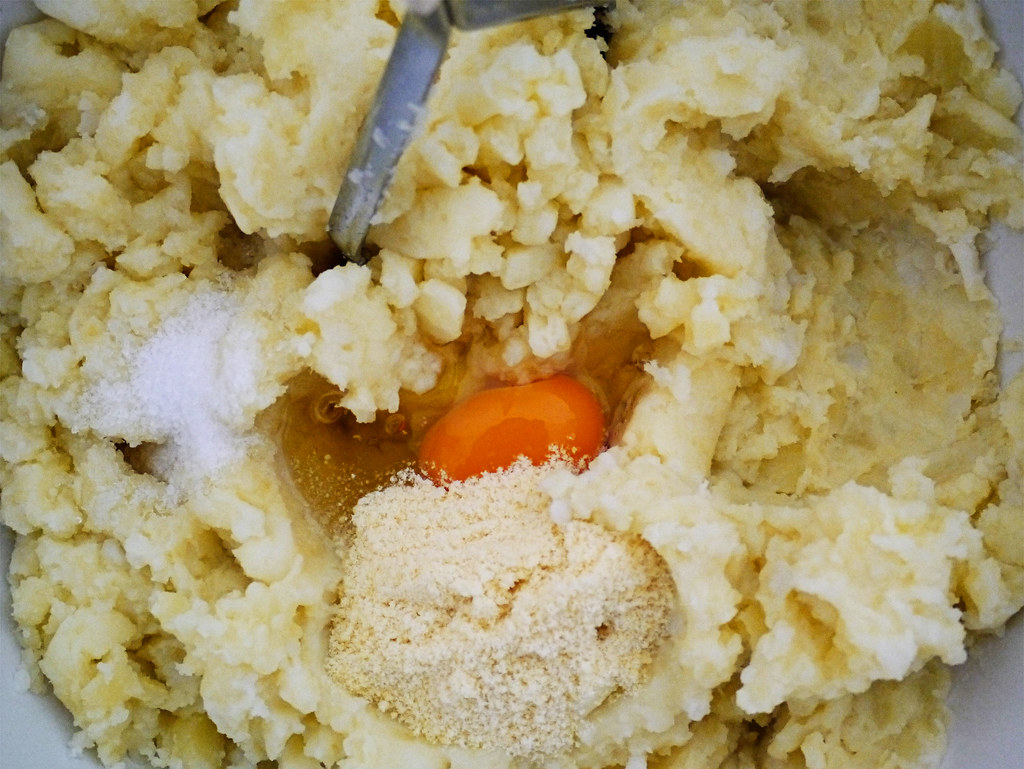
Gently mix in the egg, salt and Parmesan.
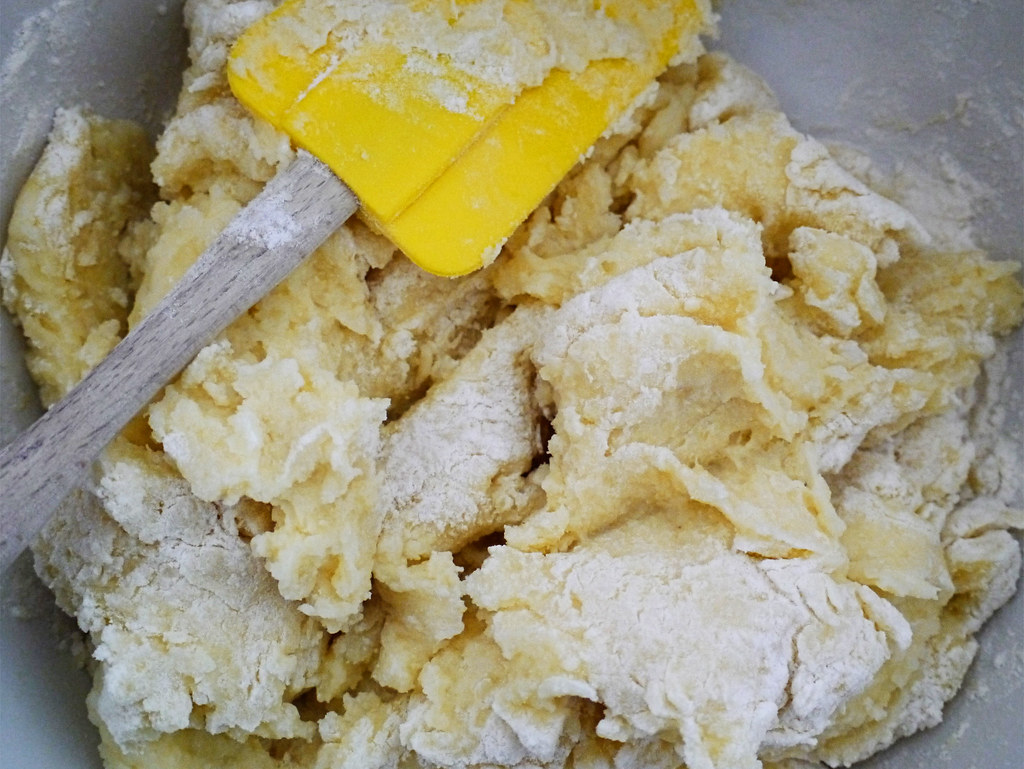
Sieve in the plain flour and combine with a few swift folds.
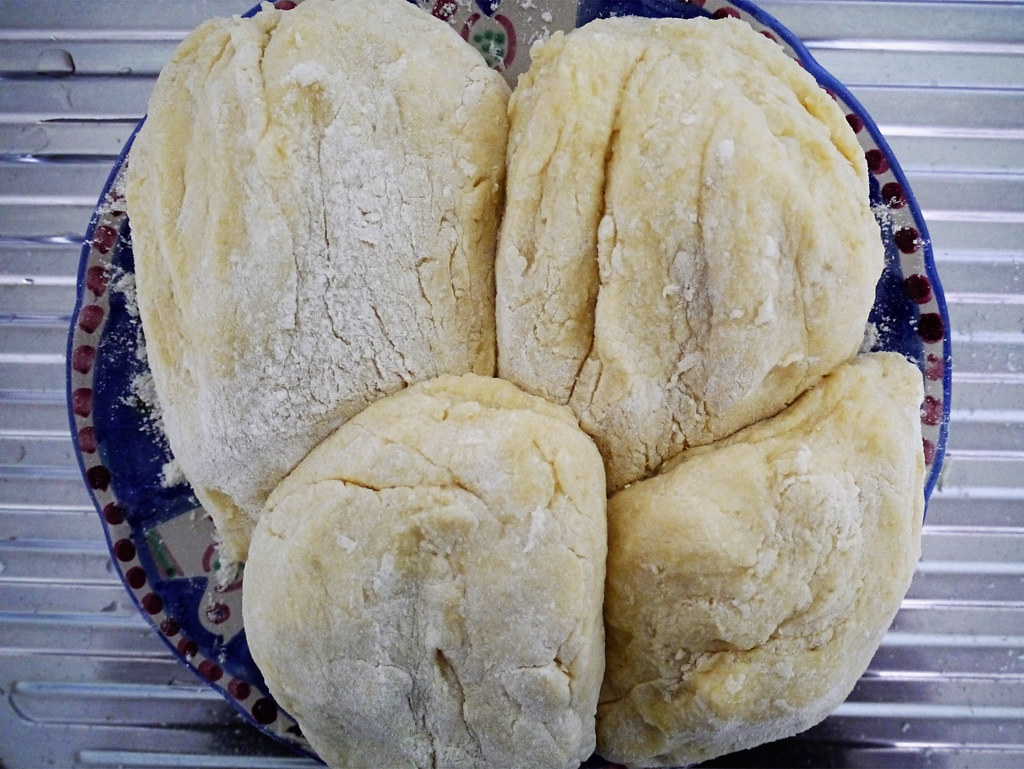
Tip potato mixture onto a lightly floured bench and gently work it into a smooth uniform mound.
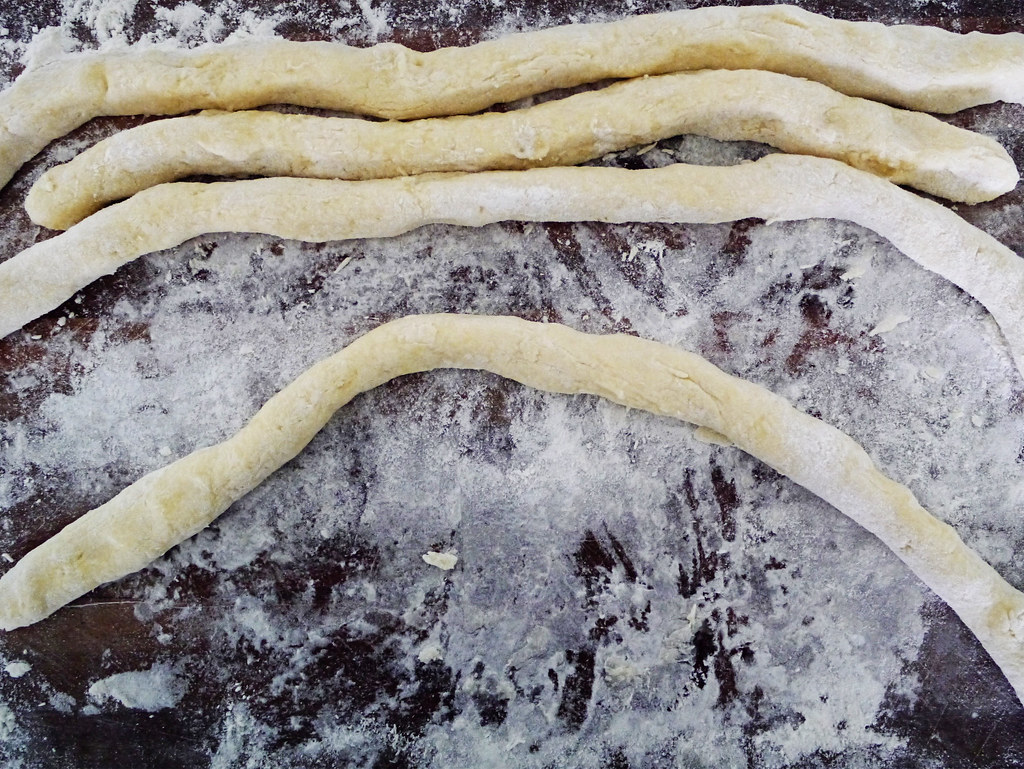
Cut off ¼ of the potato mix at a time and roll out into a sausage shape to a thickness of about 1½ cm.
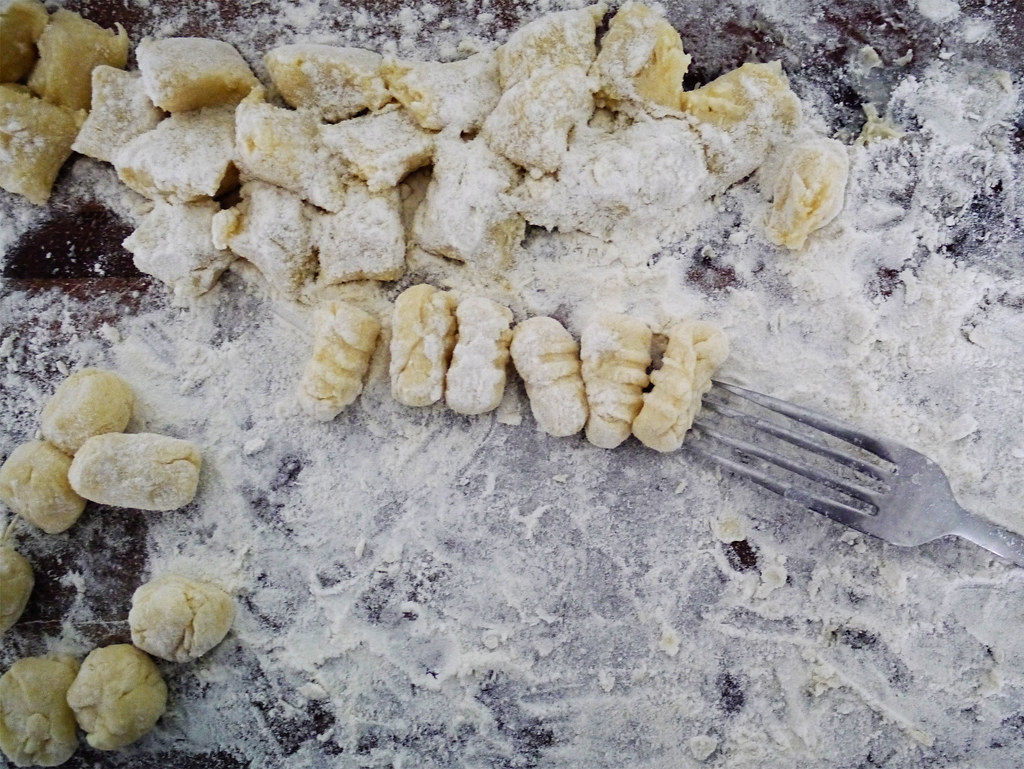
Cut each sausage into 2 cm pieces. Roll each 2 cm pieces along a fork tines to form grooves and shape the gnocchi to look like shells/grubs. Makes approx 60 pieces per sausage.
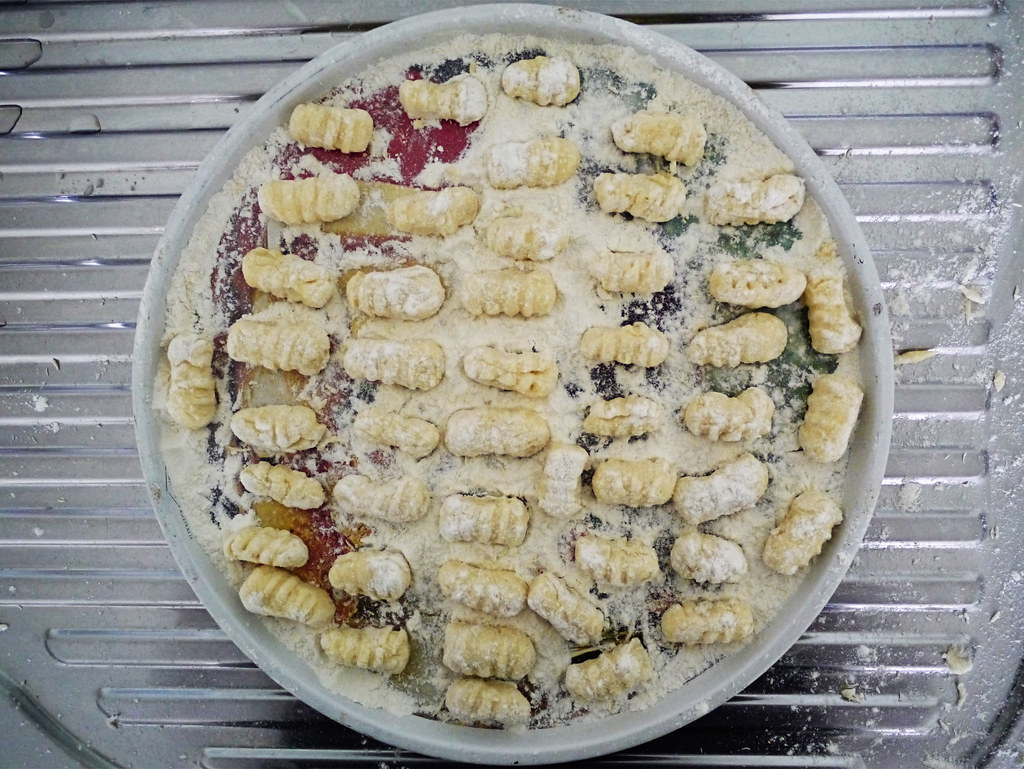
Place these on a tray lined with grease proof paper/flour, ready for cooking in salted boiling water.

For the sage butter, heat the 200 grams of butter in a shallow frying pan. When starting to bubble, add the sage leaves and cook until crisp and almost translucent. Pour through a sieve placed over a bowl. Spread the leaves on paper towel to drain. Keep warm. Reserve butter.
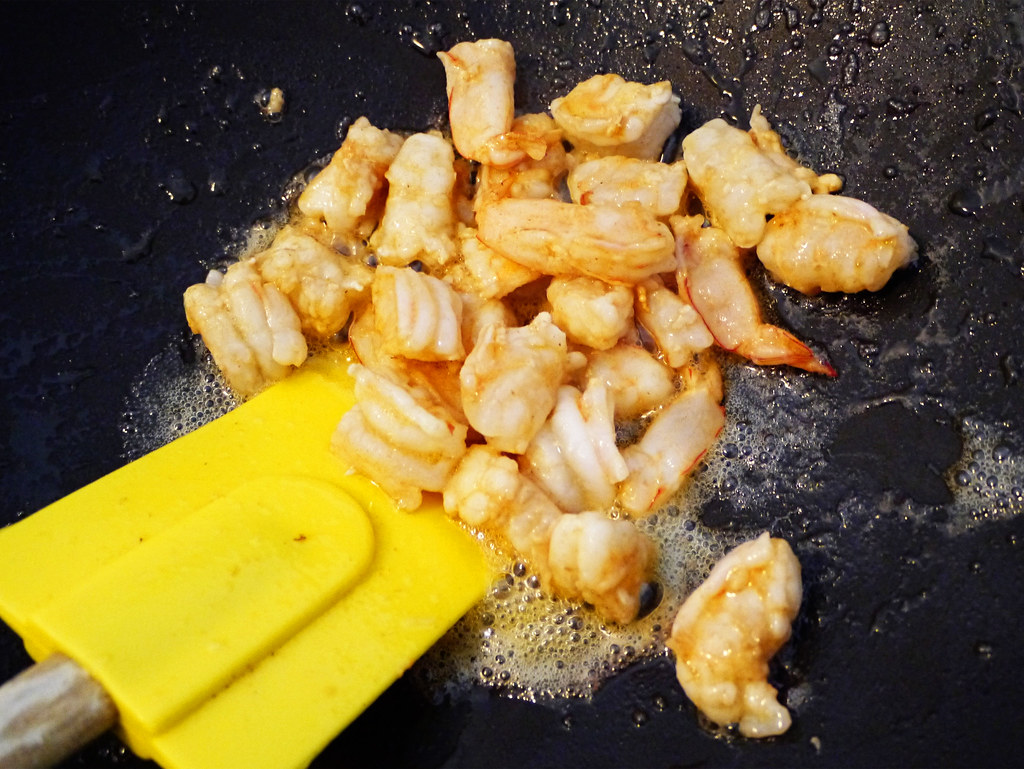
When ready to cook/serve the gnocchi (for two people), heat 20 grams of unsalted butter in a wide frying pan. It should reach beurre noisette (nut brown stage) before adding 100 grams of prawn meat. Sauté for one minute.
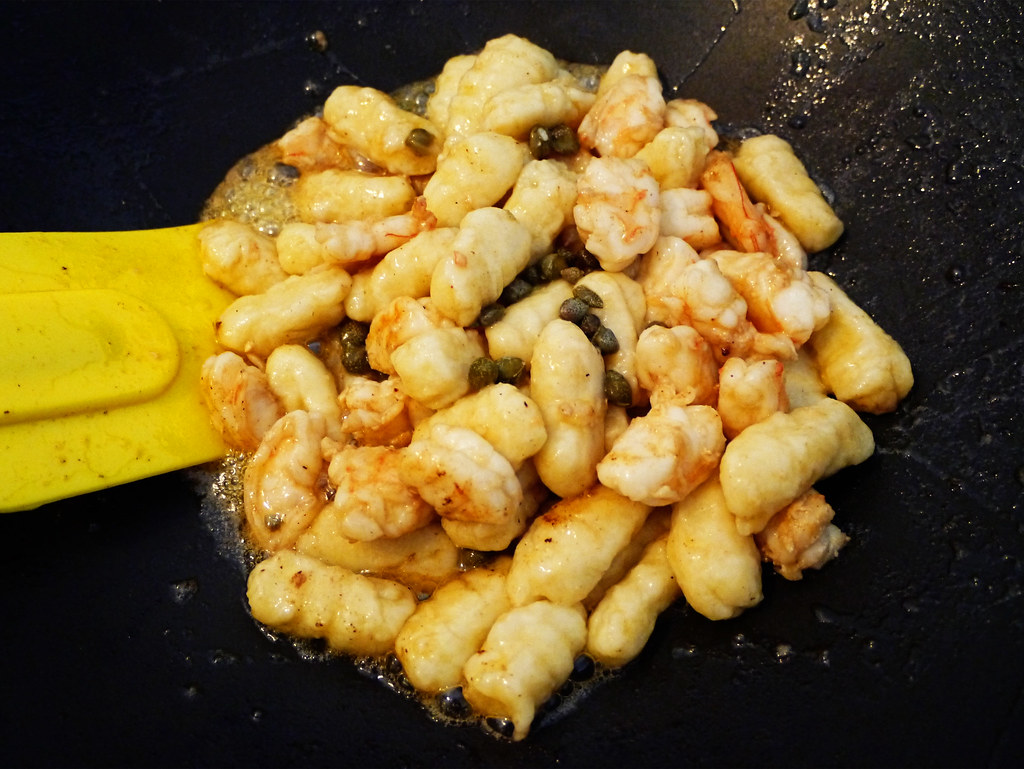
Deglaze with a dash of verjuice and add 2 tsp of capers.
Cook gnocchi in a large pan of boiling salted water in small batches of 20 pieces at a time. Shortly after the gnocchi has risen to the surface (test to see if it is cooked) remove with a strainer, drain and add to the pan. Toss the pan to coat the gnocchi in the butter.
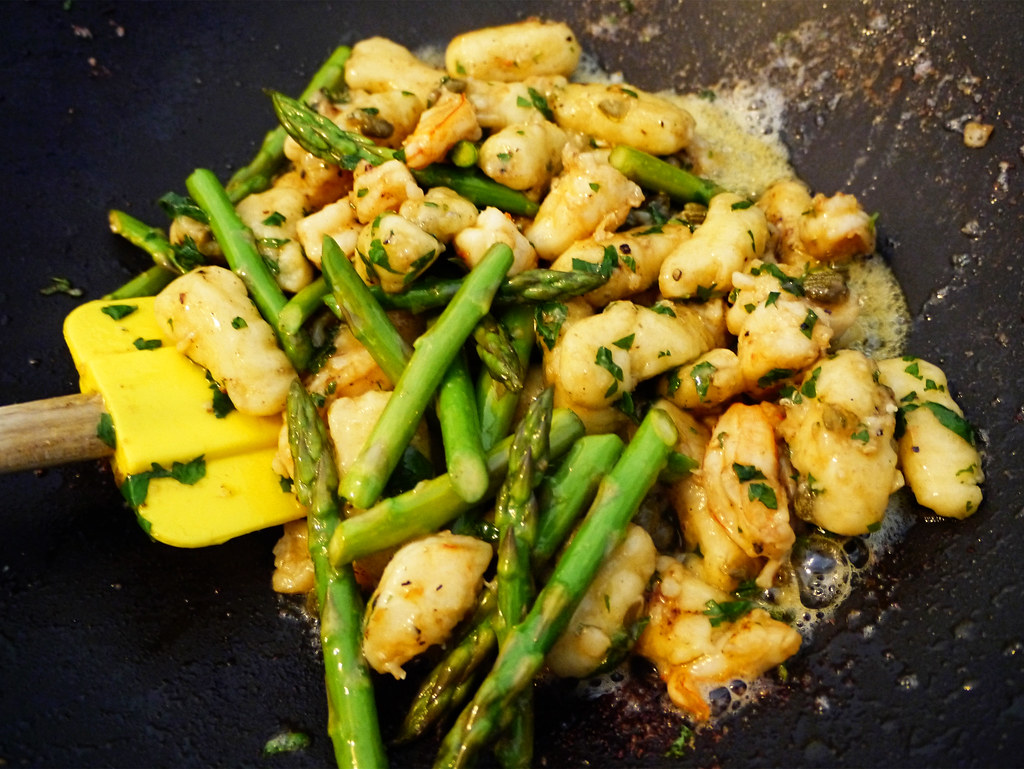
Add the asparagus and stir through gently. Season with salt and pepper and add 1 Tbsp of chopped parsley.
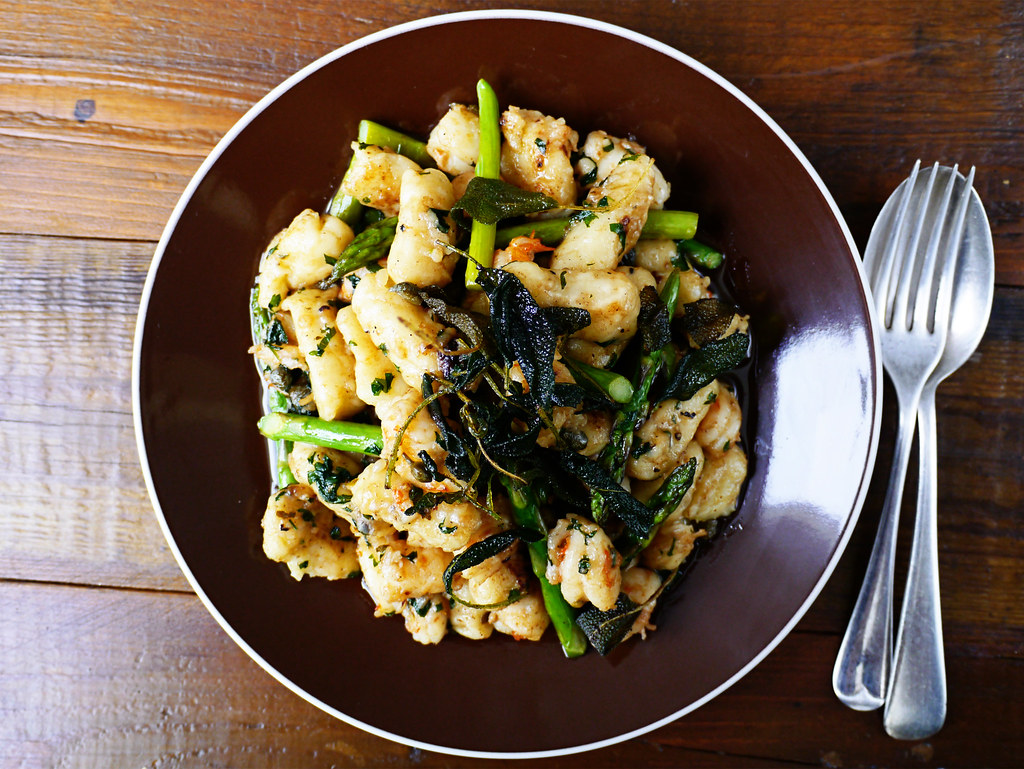
Spoon among 2 serving plates and top with fried sage leaves. Deglaze the pan with a little of the sage butter previously saved and pour over the finished gnocchi. Repeat twice more to complete 6 serves. Season to taste. Truly yum!
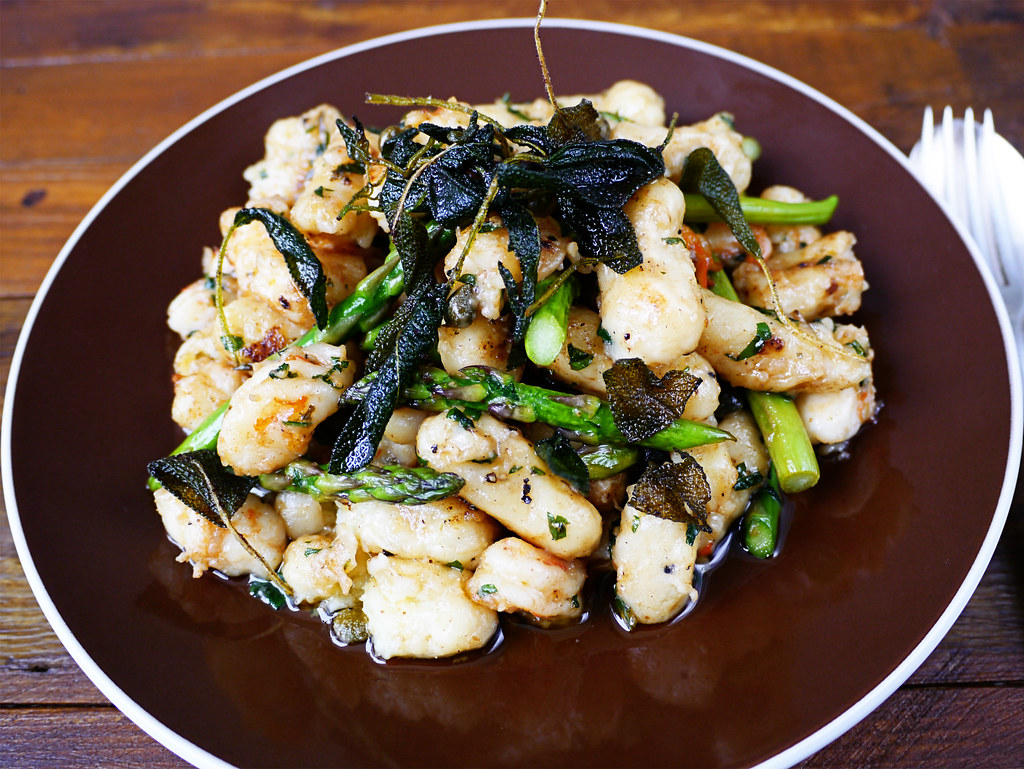
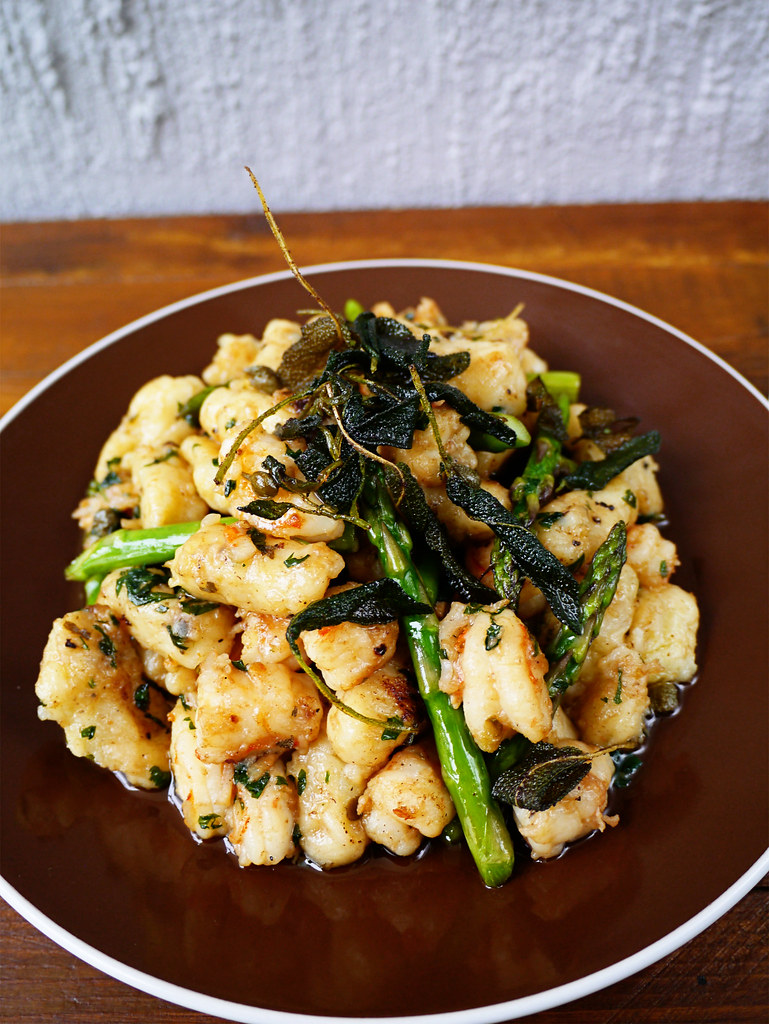
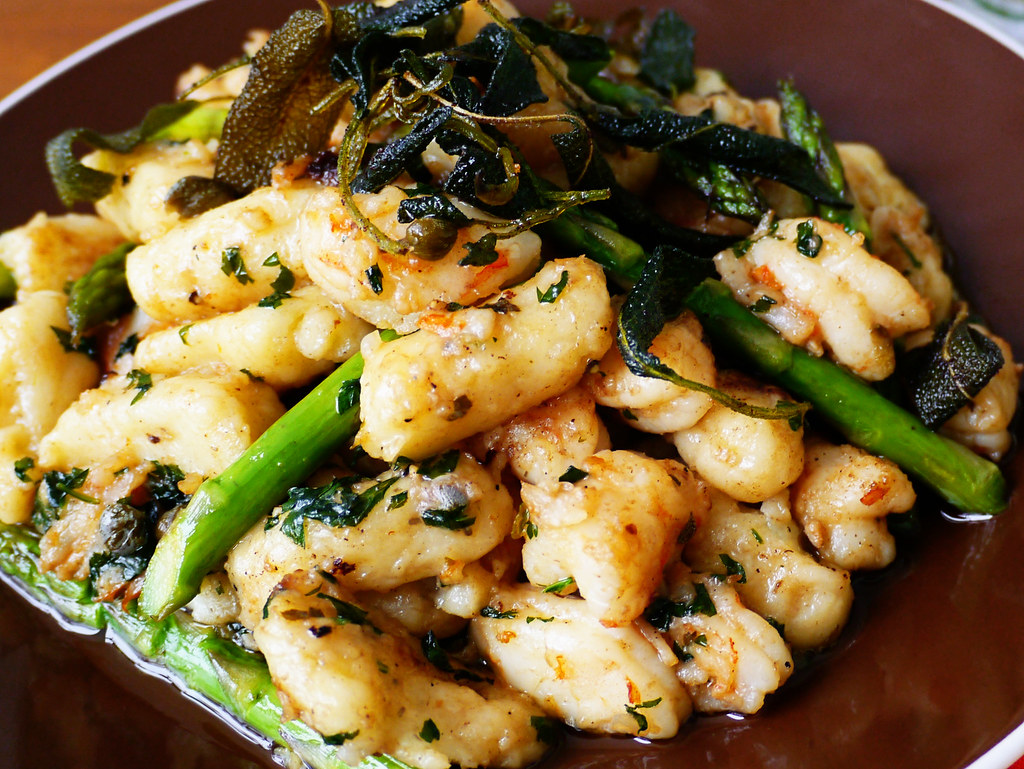
- 1.5 kg of starchy potatoes (scrubbed and washed)
- 1 egg
- 2 Tbsp of Parmesan
- 125 grams of plain flour
- 2 tsp of salt
- 200 grams of unsalted butter
- 1 bunch of sage (leaves picked from stems)
- 1 bunch of asparagus (sliced diagonally)
- 600 grams of raw prawns (deshelled, deveined and chopped into 2 cm pieces)
- 60 grams of unsalted butter
- 6 tsp of salted baby Capers (rinsed and drained)
- ¼ cup of flat-leaf Parsley (finely chopped)
- verjus
- salt and pepper to taste
- Place unpeeled potatoes in a large saucepan of cold water and bring to the boil. Reduce heat and simmer for 30 minutes or until tender. The potatoes must be neither under nor over cooked. Test with a skewer - when it is easily inserted, they are cooked (avoid testing too frequently otherwise they may become water logged).
- Drain potatoes into a colander, cover with a fresh tea towel and place colander over the original pot in a warm place for 10 minutes to drain completely.
- When potatoes are drained and cool enough to handle, peel them and pass through a mouli in batches, into the original dry saucepan. Optionally, you can use a potato masher or fork to mash the potatoes.
- Gently mix in the egg, salt and Parmesan. Sieve in the plain flour and combine with a few swift folds.
- Tip the potato mixture onto a lightly floured bench and gently work it into a smooth uniform mound.
- Using a pastry scrape, scrape down the bench, wash and dry your hands and lightly flour the surface again.
- Cut off ¼ of the potato mix at a time and roll out into a sausage shape to a thickness of about 1½ cm.
- Cut each sausage into 2 cm pieces. Roll each 2 cm pieces along a fork tines to form grooves and shape the gnocchi to look like shells/grubs. Makes approx 60 pieces per sausage.
- Place these on a tray lined with grease proof paper/flour, ready for cooking in salted boiling water.
- For the sage butter, heat the 200 grams of butter in a shallow frying pan. When starting to bubble, add the sage leaves and cook until crisp and almost translucent. Pour through a sieve placed over a bowl. Spread the leaves on paper towel to drain. Keep warm. Reserve butter.
- When ready to cook/serve the gnocchi (for two people), heat 20 grams of unsalted butter in a wide frying pan. It should reach beurre noisette (nut brown stage) before adding 100 grams of prawn meat. Sauté for one minute. Deglaze with a dash of verjuice and add 2 tsp of capers.
- Cook gnocchi in a large pan of boiling salted water in small batches of 20 pieces at a time. Shortly after the gnocchi has risen to the surface (test to see if it is cooked) remove with a strainer, drain and add to the pan. Toss the pan to coat the gnocchi in the butter.
- Add the asparagus and stir through gently. Season with salt and pepper and add 1 Tbsp of chopped parsley.
- Spoon among 2 serving plates and top with fried sage leaves.
- Deglaze the pan with a little of the sage butter previously saved and pour over the finished gnocchi. Repeat twice more to complete 6 serves. Season to taste. Truly yum!
Did you know?
- Gnocchi is plural, and gnoccho is singular. 7
Dialogue:
NS: “Are you going to leave that last gnoccho staring at me?”
NL: “Yep!”
Notes:
- Reference: http://en.wikipedia.org. ↩
- Reference: http://en.wikipedia.org, http://www.craftsy.com. ↩
- Reference: http://www.delallo.com. ↩
- Reference: http://en.wikipedia.org. ↩
- Reference: http://en.wikipedia.org, http://www.annamariavolpi.com. ↩
- Reference: http://www.craftsy.com. ↩
- Reference: http://en.wikipedia.org. ↩